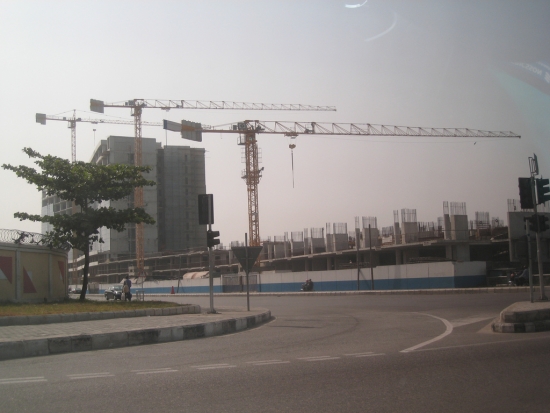Nigeria is now the most expensive country in sub-Saharan Africa to rent commercial office space, a new survey claims.

The report, by Broll Property Services, says that businesses are now paying $37 [£22] a month for a square metre of Grade A office space in Ghana and $26 [£15] for the same floor area in both Mauritius and Madagascar, while the equivalent in Nigeria’s capital Lagos or Port Harcourt is being offered at $70 [£42] a month — almost 100 per cent higher.
Broll, one of Africa’s leading commercial property service providers, claims that despite the availability of prime properties in major city centres such as Lagos and Abuja, the needs of some international tenants looking for high-quality office accommodation has yet to be met, pushing rents even higher.
Looking at other sub-Saharan African countries, the average price for Grade A office space in Rwanda was $20 [£12] per square metre and two dollars less in Namibia. Monthly rates in Kenya range from $15 to $19 [£9 to £11] and as low as $11 [£6.68] in Zimbabwe and just $6 [£3.64] in Malawi. The majority of office space across the continent remains empty, the survey says, because of the poor economic climate and unemployment.
“Despite the springing up of several A-grade structures in recent times such as Maersk House, Churchgate II Towers, Eko Towers, FF Towers, and Mansard Place — all located on the Victoria Island axis near Lagos — rentals for these developments have remained relatively high with yearly rents ranging from $600 and $850 [£364 and £515] per square metre,” the report adds.
Obi Nwogugu is head of the real estate unit at Africa Capital Alliance. “The office space market has seen continued growth in recent times,” he said confidently, “and there is more to come.” Around 250,000sq metres will be available later this year between Ikoyi and Victoria Island with the opening of a new business hub.
The sub-Saharan office market is expected to see steady growth throughout 2014, as international companies investing in Africa search for “a conducive workplace that improves productivity and workplace satisfaction which are rare in old office stock”, a recent report by property consultants Cushman & Wakefield says. It, too, warns that unemployment is still the single biggest obstacle to African expansion and economic stability.
It’s a fear shared by business writer, Tony O. Elumelu. “Unemployment, independent of any other factor, threatens to derail the economic promise that Africa deserves,” he said.
“It’s a time bomb with no geographical boundaries. Economists expect Africa to create 54 million new jobs by 2020, but 122 million Africans will enter the labour force during that time frame. Adding to this shortfall are tens of millions currently unemployed or underemployed, making the human and economic consequences nearly too large to imagine.
“Even with the strong economic growth we have seen over the past decade, job creation in Africa remains much too slow. Africa needs a comprehensive, coordinated effort focused on building infrastructure, modernising the business sector and improving trade,” he added.